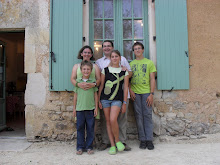Before flying back to KL I had rushed to buy school supplies in France. The French Lycee in KL had given us specific class lists for Marc’s entry to the Primary section, underlining the fact that some things cannot be found in KL. So off we went to Super U to stock up.
We started with a huge cartable rigide, a satchel-like school bag that French kids carry on their back. Not knowing French cartoons character were in or out Marc hesitated for ages, eventually choosing a Titeuf schoolbag, which seemed a popular choice for 6 year-old boys. We found an ardoise blanche, a mini-whiteboard for letter practice. I searched for ages for a chiffon, until I realized it was just a cloth or rag for cleaning the whiteboard. We looked at the reams of graph paper with tiny squares for writing perfectly, and I sensed that Marc would be doing a lot of letter practice. Marc threw in much-needed erasable pens that had not reached KL shops yet, and we searched for the mysteriously named taille-crayon avec reservoir, which is just a pencil sharpener with a container to hold sharpenings. We also needed a beginner’s French dictionary and thesaurus. I threw in a world map blotter too, with the names in French, which I thought might be useful for Geography.
Marc started CP or cours preparatoire in September. The French system allows a relaxed curriculum until the year children are six, then it kicks in. ‘Academic’ is the keyword and children are given nine months to learn how to read or write or redouble or re-take the whole year again. I had never heard of re-taking in England, unless for a special circumstances like a child was sick for a long time and missed too much work. Jacques explained to me that in the French system if you failed a year you had to redo it. That explained why some of his friends left school aged 19 or 20 or finished university at age 22. Although it was a bad thing for the child, it made sense for the teacher, because the children were a homogenous group, rather than having the extreme differences in ability that a UK teacher might have in their year-group.
The year started well, a small class of twelve and an excellent male teacher from Paris who was well prepared (he even had his own website with coursework on for those who might miss a day). Marc already knew how to read and simply had to ‘transfer’ the knowledge across. However we soon discovered what I call the ‘i/e’ problem. In English the letter ‘i’ sounds like ‘eye’ and ‘e’ is ‘ee’, but in French the ‘i’ is a ‘ee’ sound and ‘e’ is like an English ‘i’. So spelling became a nightmare, with me saying ‘i’ when it should be ‘e’ and vice versa. Marc has never recovered from that period and still mixes up his e’s and ‘i’s…
Marc had a copy of a poem or a poesie to learn each week. Not a simple little children’s poem about bunnies or tigers, but a proper rhyming fifteen-liner with deep meanings and tricky vocabulary. Here we hit our first tip of the iceberg regarding homework. I just couldn’t do the poem. I didn’t know what it meant and had no idea of the right rhythm, rhyme or inflections. On Fridays Marc would do his haltering English-accented poem and systematically got a bad grade. After a tactful Parents meeting in November, when the teacher pointed out Marc’s handicap Jacques stepped in and took over poesies. Jacques seemed to enjoy it, and it was simply a matter of repetition he said. Five lines repeated five times every day. He explained all the unknown words and it made sense to Marc. Jacques could remember poems from his childhood so it must work, I thought, although I was sure that learning poems off by heart went out with the 1970’s education act in England…
Nina was blossoming in Moyen or middle section of the maternelle school. She had lost her shyness and now the teacher couldn’t stop her talking. She was enthusiastic and gave her all in class. Nina needed friends now and got on well with a little English/French girl called Isolde, and a Tunisian girl, Alya, whose family spoke French. There were new girl twins in the class too, Julie and Marie, and Nina quickly became friends with them too. Between the mothers we started a play date system and the girls came round regularly to dress up, play Barbies or swim. They all talked French together and when they were gone Nina would continue to talk in French to her Barbies or dolls. She seemed so at ease in French we could hardly believe that three months before she would barely speak a word. It finally seemed we had made a good decision on the choice of school.
Subscribe to:
Post Comments (Atom)



No comments:
Post a Comment